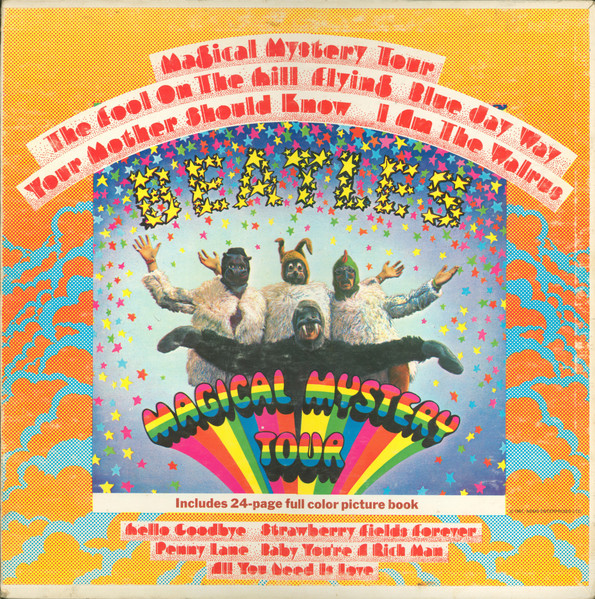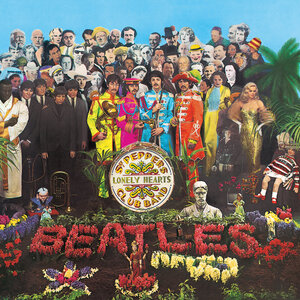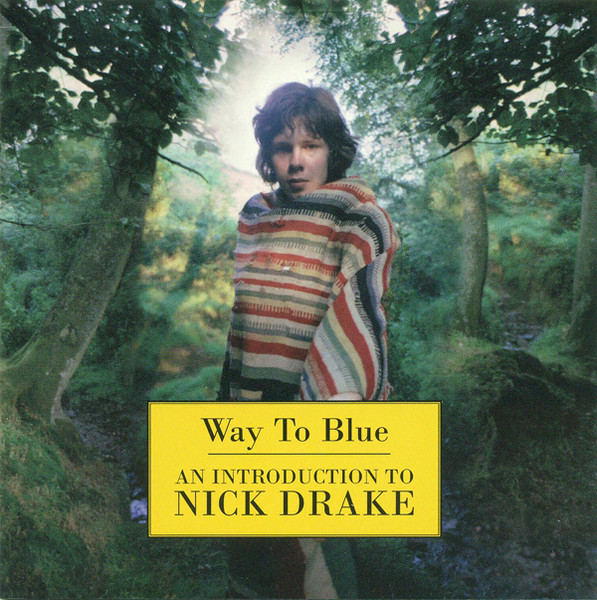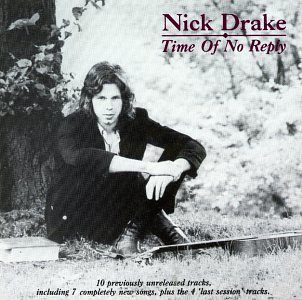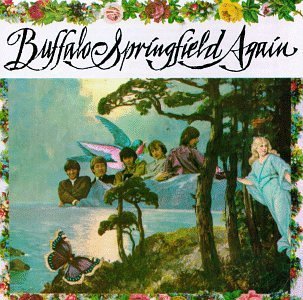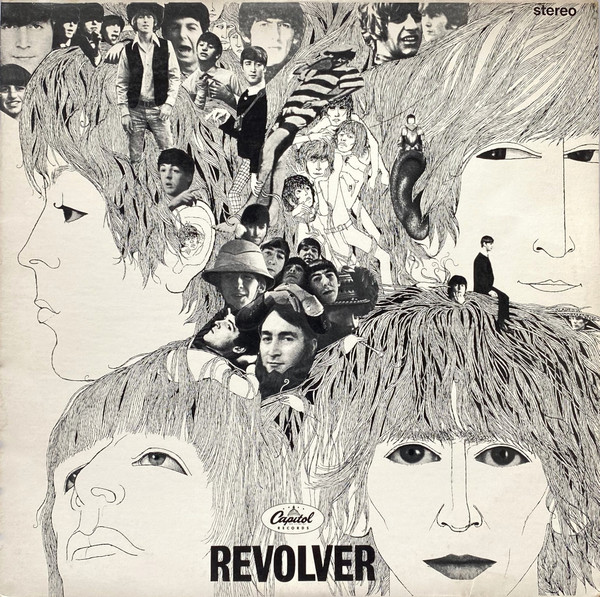The Beatles stayed relatively quiet musically throughout 1968 while being constantly in the news. The year saw exactly two singles plus one double album appear, and Capitol fought the temptation to collect some of the loose ends onto an LP. (Of course, the
Magical Mystery Tour album had taken care of the bulk of the recent leftovers.)
At this point in their career the boys were teeming with ideas, and had the pull to cram as much music as they wanted onto wax—in this case, a two-record set in a plain white cover simply titled The Beatles, which was immediately informally dubbed the White Album. If they had the nerve, they could have put out a three-record set, and it would have sold. As it is, one of the ongoing arguments among Beatlemaniacs is how to create the perfect single-disc version of the White Album.
One reason is that there’s so much to choose from, and most of it is really, really good. They’re still using lots of studio tricks, but they’d just come back from India with thirty songs that had been constructed on acoustic guitars. Most of the performances are straightforward rock ‘n roll songs, and the rest are pretty mature ideas from a bunch of kids with nothing but time.
Even with all the music to choose from, the boys took care to sequence the album well. Neither John nor Paul gets more than two songs in a row, George gets a song on each side—and they’re all excellent—and even Ringo appears twice, one of which being a song he wrote all by himself. (He managed to accomplish this even having quit the band for a few weeks during the sessions.) They also put all the song titles with animals on the same side. Yet despite the wide range of styles, genres, and attitudes, plus the isolationist method each used to craft their songs, the album still makes a cohesive whole. (Also, by this time there weren’t any differences between the American and British versions, except for some cosmetic touches in the factory-stamped packaging, which included lovely individual color shots of the boys, plus a fascinating collage of a poster with all the album’s lyrics—save one track—on the other side.)
We fly in with the Beach Boys pastiche of “Back In The U.S.S.R”, slip over to check on “Dear Prudence”, and are jolted into reality with the mythological baiting of “Glass Onion”. “Ob-La-Di, Ob-La-Da” is fun despite itself, while Paul turns it upside down for “Wild Honey Pie”. John provides a twisted nursery rhyme worthy of his books in “The Continuing Story Of Bungalow Bill”, and George shines with “While My Guitar Gently Weeps”. “Happiness Is A Warm Gun” rocks out side one.
“Martha My Dear” isn’t really about Paul’s dog, but “I’m So Tired” is a clever sequel for a guy who used to be only sleeping. “Blackbird” presents a folk allegory before the classical counterpart in George’s “Piggies”, and “Rocky Raccoon” continues the animal theme, kinda. Ringo finally finishes the song he’d started at least five years earlier in “Don’t Pass Me By”, whereas Paul took way less time for “Why Don’t We Do It In The Road?” “I Will” is sweet and simple, but John’s tribute to his mother (and Yoko) in “Julia” is the true gem.
Just in case you forgot what a good band this is, “Birthday” and “Yer Blues” positively scorch. “Mother Nature’s Son” is something of a respite before the clanging bell and upside-down rhythm in “Everybody’s Got Something To Hide Except Me And My Monkey”. “Sexy Sadie” offers up some dirty doo-wop, but “Helter Skelter” sets everything on fire, just so George’s purposely quiet “Long, Long, Long” can calm things down.
A version of “Revolution” markedly different from that summer’s B-side takes some of the edge off it, and “Honey Pie” is not at all like the preview on side one. “Savoy Truffle” is George’s sax-filled tribute to chocolate and dental bills, and “Cry Baby Cry” is John’s final nod to Lewis Carroll. A spooky snippet from Paul leads into an overheard conversation and a voice chanting “number nine” for eight nightmarish minutes dubbed “Revolution 9”, which finally fade away so Ringo can sing the lullaby of “Good Night”, since nobody else possibly could.
Revolver is the ultimate desert island CD, but if you can bring an album, you could make a persuasive argument in choosing the White Album. It doesn’t get five stars, since too many people would have a justifiable beef over “Revolution 9”. “Birthday” has also worn out its welcome over the years. Would it really be better as a single album? Maybe. But Paul said it best: “It’s the bloody Beatles White Album, shut up.” Okay then.
But how about this: Dear Prudence - Glass Onion - While My Guitar Gently Weeps - Martha My Dear - I’m So Tired - Blackbird - Piggies - Don’t Pass Me By; Yer Blues - Mother Nature’s Son - Sexy Sadie - Helter Skelter - Honey Pie - Cry Baby Cry - I Will. Those are the current Everybody’s Dummy contenders for a single-disc, 45-minute White Album (with “Ob-La-Di, Ob-La-Da” backed with “Long, Long, Long” for the concurrent single). And it’s never easy.
A limited CD package that merely replicated the cardboard packaging of the album, with top-loading pockets for the inner sleeves, photos, and poster, was released for the album’s 30th anniversary. But two decades later, a year after Sgt. Pepper was extravagantly expanded for its own 50th anniversary, the White Album got similar lush treatment, starting with a fresh mix. The cheap version added a bonus disc of the so-called “Esher demos”, 27 songs recorded on acoustic guitars and percussion at George’s house the week before the album sessions started, including some that would be held over for future projects. Non-fanatics might have heard some of these on Anthology 3, but here they all were in best-ever sound, albeit arranged in the eventual album order.
That was all well and good, but a mere trifle compared to the Deluxe Edition, which came in the form of a gorgeous hardcover book—numbered, of course—with a Blu-ray disc with the requisite 5.1 surround mixes and even the mono mix, and wonder of wonders, three more CDs of session outtakes, most never even bootlegged. These traveled the whole length of the project, beginning with the ten-minute take of “Revolution 1” that would become the basis of that track as well as “Revolution 9”. We get to hear works-in-progress of most of the album, as well as “Hey Jude” and “Revolution”, early versions of “Good Night” with guitar and harmonies, more of the sequence that led to “I Will” and the “Can You Take Me Back” snippet, 13 minutes of “Helter Skelter”, a surprising jam on “Let It Be”, and most of all, audio evidence of all four guys actually enjoying themselves and each other. For balance, the set closes with peeks at “The Inner Light”, “Lady Madonna”, and “Across The Universe”, helping to present a wider picture of the band in 1968.
Naturally, this is only the tip of what was recorded, as the book tantalizingly details other takes, and the compilers were careful not to repeat too much from Anthology 3. There are those who will not die happy if they don’t hear the 27-minute version of “Helter Skelter”, and some video material would have been nice, but now that one of the most famous double albums has been tripled in size, it’s moot.
The Beatles The Beatles (1968)—4½
2018 50th Anniversary Edition: same as 1968, plus 27 extra tracks (Deluxe Edition adds another 50 tracks plus Blu-ray)
 When the film underwent a major visual overhaul to coincide with its 30th anniversary, the advertising wizards decided to prepare a companion album that would include every song from the film. Yellow Submarine Songtrack was very well received, if strangely sequenced. Overall, the sound is beefier and nicely complements the brilliant colors of the restored video. Having been restored to its proper place in the film, “Hey Bulldog” was the emphasis track, and was even promoted with re-edited footage from the old “Lady Madonna” promo clip to sync with the recording. A new mix of the title track brings out more sound effects and John’s responses on the last verse.
When the film underwent a major visual overhaul to coincide with its 30th anniversary, the advertising wizards decided to prepare a companion album that would include every song from the film. Yellow Submarine Songtrack was very well received, if strangely sequenced. Overall, the sound is beefier and nicely complements the brilliant colors of the restored video. Having been restored to its proper place in the film, “Hey Bulldog” was the emphasis track, and was even promoted with re-edited footage from the old “Lady Madonna” promo clip to sync with the recording. A new mix of the title track brings out more sound effects and John’s responses on the last verse. 
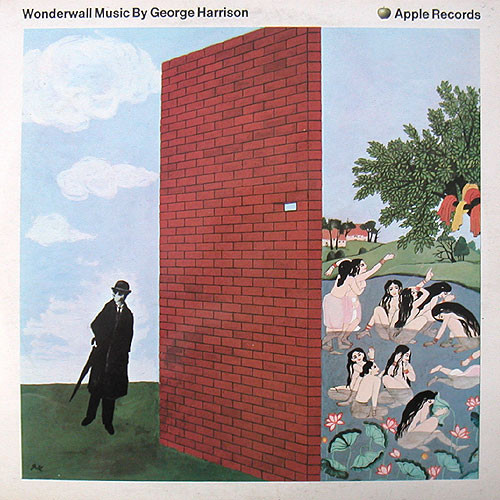

:format(jpeg):mode_rgb():quality(40)/discogs-images/R-12140622-1529111405-9048.jpeg.jpg)
